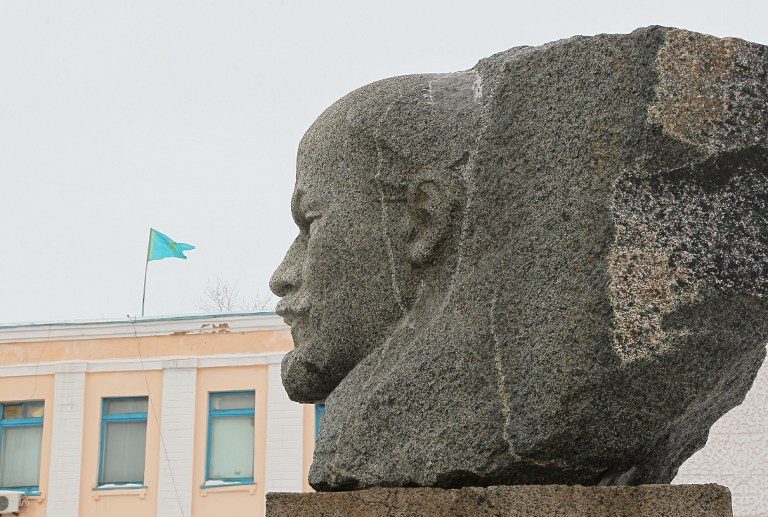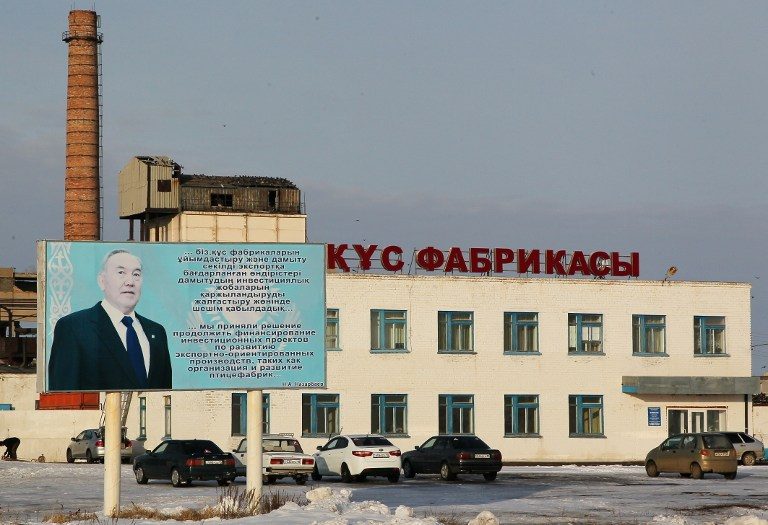SUMMARY
This is AI generated summarization, which may have errors. For context, always refer to the full article.

ARKALYK, Kazakhstan – In 1991, as one provincial Kazakh town embarked on a journey through independence that would see it transformed into a state-of-the art capital, another hurtled towards collapse.
Arkalyk, a Soviet-built mining town is a 13-hour train ride from Kazakhstan’s glittering capital Astana, and the last stop on a spur of railway that burrows west and then south into the vast country’s mineral-rich heartland.
As the Soviet Union crumbled, demand for the bauxite mined in Arkalyk that made up a fifth of the bloc’s output plummeted.
So too did the town’s population, now less than half of its communist-era high of over 60,000 people.
On Arkalyk’s outskirts, abandoned apartment blocks spring up from the snow-sprinkled steppe that extends as far as the eye can see. The roads leading out of the town are deeply rutted.
Comparisons with glitzy Astana, whose population has roughly quadrupled since it replaced Almaty as Kazakhstan’s capital in 1997, rankle with many Arkalyk inhabitants.
“We see millions spent on the EXPO (international event Astana hosts in 2017) and sporting events, while our own town lacks qualified doctors,” says Dana Zheksembayeva, a student in Astana who splits her time between the two cities.
“Maybe for the country’s image these events mean something but people living in towns like Arkalyk have other concerns.”
Stability and corruption
Energy-rich Kazakhstan is the wealthiest of the 5 ex-communist Central Asian countries and was the last to declare independence, on December 16, 1991.
But complaints of an ever-widening gulf between capitalism’s winners and losers and the mismanagement of state funds echo throughout the graft-riddled region.
In Kazakhstan’s gas-rich neighbor Turkmenistan, international rights groups say the government is forcibly evicting citizens from their homes as it prepares to host the 2017 Asian Indoor Games in the capital Ashgabat.
In Tajikistan, the region’s poorest country, the capital Dushanbe stands as an ode to megalomaniac architecture, even as most of the country endures rolling winter power cuts.
Central Asia’s secular governments have been quick to take credit for the majority-Muslim region’s relative stability.
But that achievement is at least partly due to “the astonishing effectiveness of Soviet state-building”, says John Heathershaw, a Central Asia expert at the University of Exeter in Britain.

Regimes in both Turkmenistan and Uzbekistan have witnessed a stable transfer of power following the deaths of autocrats that began their reigns during the communist era.
Tajikistan endured a civil war, which cost tens and thousands of lives and ended with victory for the central government and leader Emomali Rakhmon in 1997.
Comparatively democratic Kyrgyzstan is the only country in the region to have see governments overthrown, in 2005 and 2010 respectively, and host genuinely competitive elections.
“All these rulers preside over deeply corrupt systems of graft and many oversee security services that torture political opponents,” Heathershaw told Agence France-Presse.
Uncertain future
Kazakhstan’s leader Nursultan Nazarbayev, 76, is now the most senior across the 5 countries after Uzbek neighbor Islam Karimov died aged 78 in September.
His popularity, resting in part on impressive economic growth that coincided with rising oil prices has been tested by their sudden collapse in 2014.
In April and May this year, thousands took part in nationwide protests over a proposed land reform that Nazarbayev later shelved in order to quell the unrest.
But many analysts said popular dissatisfaction was rooted less in land and more in the economic slump in a country where freedoms are habitually restricted.
“All the time we were told how great things were. Now things look less than great and questions have piled up for the government,” Rinat Balgabayev, an Astana-based PR specialist famous for his political jokes on social media, told Agence France-Presse.
In the capital that a quarter of a century ago was just a provincial steppe town of 250,000 people, independence was celebrated with the pomp typical in countries of the region.
On Friday, December 16, Nazarbayev opened a 46-meter- (150-foot-) high white marble monument he said “symbolizes Kazakhstan’s upward aspirations”.
Fireworks were set off close to the giant cone-shaped Khan-Shatyr building, designed by British architects Foster + Partners.
But in Arkalyk, where many residents retain an understandable nostalgia for the Soviet past, there was much less excitement in the build up to the holiday.
An Agence France-Presse correspondent saw only a few signs marking the event, mostly outside the City Hall.
Municipal officials pointed to a recently built poultry factory and a future road running through the region as signs of a potential economic revival.
But residents fear for the future, since reserves at the bauxite mine where up to 1,000 people work – earning $300 or more a month – will reportedly run out in the next five or so years.
“The town depends on the mine, and output there will drop,” said Raihana Baimuratova, a 55-year-old housewife. “So I cannot tell you that I think the town is better off than during communist times or that Arkalyk’s situation will soon improve.” – Christopher Rickleton with Dana Rysmuhamedova in Astana, and pictures by Stanislav Filippov, Agence France-Presse / Rappler.com
Add a comment
How does this make you feel?
There are no comments yet. Add your comment to start the conversation.